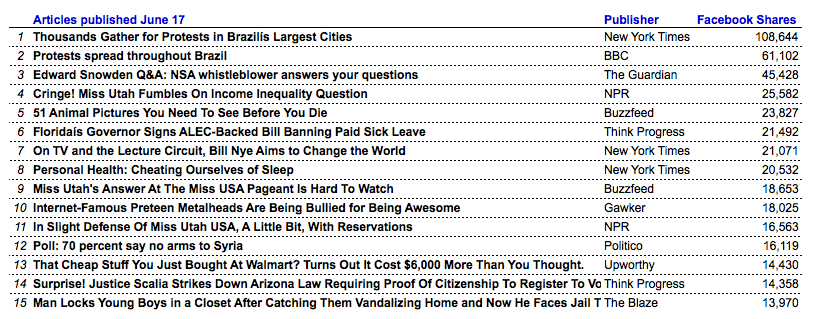
The 15 most shared news stories on Monday and why they went viral
Knight Foundation supports PolicyMic, an online platform for political news and debate, through its Enterprise Fund. Below, Jake Horowitz, its co-founder and editor-in-chief, and Liz Plank, its viral content and social justice editor, write about Monday’s most shared stories on Facebook. Photo credit: Flickr user Izaias Buson.
Every online news outlet is trying to master viral content, but there’s a key secret to producing shareable articles that most news sites fail to understand. Given Buzzfeed’s soaring growth, there’s a common misconception that light-hearted content, whether in the form of cat videos or lifestyle list stories, makes for the most compelling articles on the social web. A recent Foreign Policy post juxtaposing images of hairless cats and Russian President Vladimir Putin is just one example of how large news outlets are implementing this strategy. But, one review of some simple data on shareable content shows why this approach is fundamentally flawed.
Take a quick look at the 15 most shared news stories on Facebook published on Monday, June 17. There’s only one light list article: “51 Animal Pictures You Need to See Before You Die.” There’s a deeper pattern here: Quality articles on important topics – such as the BBC article on the Brazil protests and the New York Time profile of Bill Nye – are also among the most shared stories online.

Source: Facebook API. Data as of 6/18/2013. Only includes articles published on 6/17/2013.
At PolicyMic, we’ve seen that pattern play out time and time again. Every day, we analyze sharing patterns across all high-quality news sites on the web, often using Facebook shares as a metric because of its importance as a news source among millennials. The data is also publicly available and easy to compare across publishers. At its core, Buzzfeed’s article is shareable because it plays on people’s high-arousing emotions: A very cute kitten makes people feel happy. But stories about important topics that stir anger, outrage, fear, or excitement can produce an even more powerful effect. PolicyMic’s viral team draws heavily on the basic principles of behavioral science to guide our viral content creation strategy.
From this list, stories about human rights that feature compelling stories of real people standing up for what they believe is right (i.e. the BBC and The New York Times stories on Brazil) are inherently shareable, because they tap into these emotions. People love to share powerful stories about protests or citizen uprisings because they follow the hero-villain narrative. Stories about underdogs (or a group of powerless citizens) rising up against a bully (or dictatorial government) make people feel good about the world – and drive sharing. People love to share when they are getting an inside scoop or a rare look at an issue. The Guardian’s live chat with Snowden was so successful because it taps into the emotion of intrigue and makes people feel like they are getting an exclusive perspective they can’t find elsewhere.
Finally, headlines are absolutely critical to determining what goes viral. Those that incorporate the element of surprise and pique our curiosity are always social. That’s why Politico’s story on Syria performed so well. It offered a quantitative statistic, and offered a surprising conclusion: that most Americans don’t want the United States to supply the Syrian rebels with arms. And why NPR’s headline on Miss Utah did well. When’s the last time you saw Miss Utah and income inequality in the same sentence? It’s surprising. Upworthy’s headline for its Wal-Mart article plays on a curiousity gap, giving just enough information to get the reader interested without giving the entire story away, thus compelling you to click.
The main point is not that one type of article is better than the other, but that cat videos alone won’t make you go viral. Headlines that tap into high-arousing emotions – whether serious in their focus or light-hearted – are the secret to shareable success.
Jake Horowitz is the co-founder & editor-in-chief of PolicyMic, news by millennials for millennials. Jake manages PolicyMic’s editorial content strategy, voice, audience growth, and quality. Jake has helped grow PolicyMic to over 7 million monthly unique visitors in less than two years. Jake previously worked at Change.org and the Carnegie Endowment in Beirut, Lebanon. @jacobdhorowitz
Liz Plank is the viral content and social justice editor at PolicyMic. She manages PolicyMic‘s viral content team. Liz earned her master’s degree in social policy at the London School of Economics and Political Science and a bachelor’s degree in women’s studies at McGill University. @feministabulous
Recent Content
-
Journalismarticle ·
-
Journalismarticle ·
-
Journalismarticle ·


